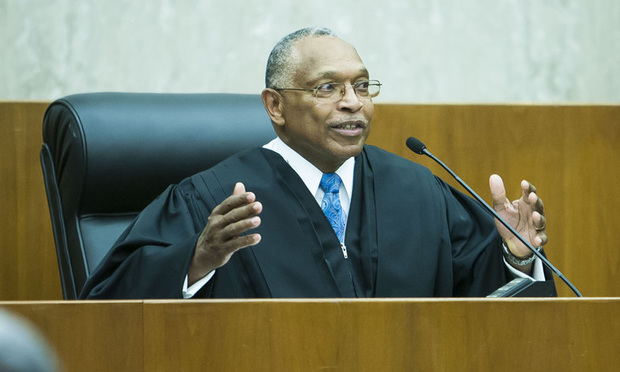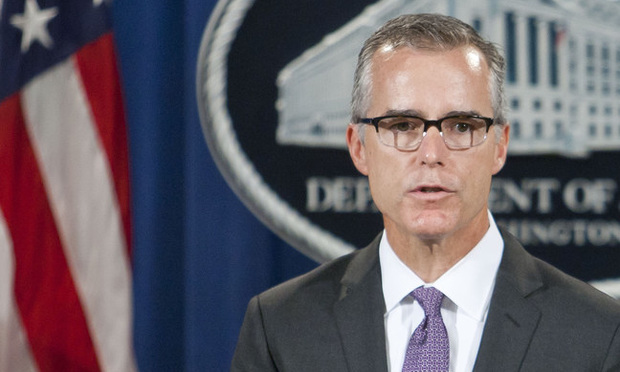Judge Questions Whether DOJ 'Manipulated' Him in McCabe Public Records Suit
Federal prosecutors denied any deception, arguing their court statements in a pending Freedom of Information Act lawsuit were made in good faith.
November 14, 2019 at 06:38 PM
5 minute read
 Judge Reggie Walton of the U.S. District Court for the District of Columbia in 2016. Photo by Diego M. Radzinschi/THE NATIONAL LAW JOURNAL
Judge Reggie Walton of the U.S. District Court for the District of Columbia in 2016. Photo by Diego M. Radzinschi/THE NATIONAL LAW JOURNAL
A federal judge on Thursday questioned whether the U.S. Justice Department had "manipulated" him into stalling the release of records related to Andrew McCabe, the former deputy FBI director who has faced a criminal investigation since last year centered on whether he lied to federal agents.
At a hearing in Washington's federal trial court, U.S. District Judge Reggie Walton grew animated as he grilled Justice Department lawyers about their recent shift in a lawsuit brought by the watchdog group Citizens for Ethics and Responsibility in Washington. The group is seeking records related to an internal FBI inquiry into McCabe's dealings with the news media.
For months, the Justice Department had argued that records should be withheld on the ground that they related to an ongoing law enforcement proceeding. But on Wednesday, the Justice Department abandoned that argument for keeping the records secret, signaling that prosecutors could be standing down from pursuing charges against McCabe. Prosecutors still haven't publicly stated the status of any ongoing investigation.
Walton appeared struck by the sudden shift in the litigation, saying Thursday he had agreed to delays based on the Justice Department's position.
"I do have some concern about whether I was manipulated. … It does cause me concern," Walton said.
Justice Department lawyer Justin Sandberg said his arguments for withholding the records were made in "good faith" and had been "amply justified."
"Your honor," he said, "you're not being manipulated."
Walton had set a Nov. 15 deadline for the government to inform him whether prosecutors were planning to bring charges against McCabe. Walton reportedly said at the earlier hearing: "This matter is a high-profile matter. And I think it does, while the matter hangs in limbo, it does undermine the credibility, not only of the Justice Department because it's not making these hard decisions, but also the court, because Congress enacted this [open records] legislation for the purpose of the American public being made aware of what its government is doing."
At Thursday's hearing, Walton did not explicitly ask whether the Justice Department had decided to drop its investigation into McCabe. But "something must have happened" for the Justice Department to discard arguments for keeping records concealed, the judge said. "It does cause me to have some question about why," Walton said.
Sandberg did not provide any firm answer, prompting Walton to voice frustration with the Justice Department's drawn-out consideration of its McCabe inquiry. Walton said it was "not a hard case" to weigh. "Maybe politically, but not factually or legally," he said.
Sandberg at one point offered to speak privately with Walton. After speaking in his chambers for 10 minutes, they emerged and set a schedule under which the Justice Department will produce 200 documents a month to CREW.
McCabe's defense lawyers in September asked prosecutors whether a grand jury had declined to indict him. The email, sent by Michael Bromwich, now a senior counsel at Steptoe & Johnson LLP, followed press reports that a grand jury had met to consider charges against McCabe without issuing an indictment.
McCabe's defense lawyers had previously appealed to Deputy Attorney General Jeff Rosen, arguing that the Justice Department lacked evidence to charge him. Rosen ultimately declined to step in to stave off a prosecution.
 Andrew McCabe, former deputy director of the FBI, on May 20, 2015. Photo by Diego M. Radzinschi/THE NATIONAL LAW JOURNAL
Andrew McCabe, former deputy director of the FBI, on May 20, 2015. Photo by Diego M. Radzinschi/THE NATIONAL LAW JOURNALLast year, the Justice Department's inspector general concluded that McCabe misled internal investigators when asked about his role providing information to a Wall Street Journal reporter in 2016 about an investigation into the Clinton Foundation. The inspector general, Michael Horowitz, referred those findings to prosecutors in Washington.
McCabe has long disputed that he lacked candor in the internal investigation. In March 2018, McCabe was fired just days before he was set to retire with full benefits. McCabe, represented by Arnold & Porter Kaye Scholer, contested his firing in a lawsuit this year that alleged his removal was part of an "unconstitutional plan" by the Trump administration to oust law enforcement officials deemed disloyal to the president.
The Justice Department filed court papers earlier this month to dismiss the case, which is pending before U.S. District Judge Randolph Moss in Washington. "If the FBI finds that one of its special agents lacked candor under oath, the standard penalty is removal," DOJ lawyers said in court papers. "Andrew G. McCabe was one of those special agents."
Read more:
Steptoe Adds White-Collar Vet Michael Bromwich
Ousted FBI Leader McCabe Sues Justice Dept. for Alleged Retaliation
Fired FBI Agent Peter Strzok, 'Demonized' by Trump, Sues For Reinstatement
Robert Mueller Got Animated Just Once: Defending His Prosecutors
Sally Yates Launches Investigations Practice as King & Spalding Partner
This content has been archived. It is available through our partners, LexisNexis® and Bloomberg Law.
To view this content, please continue to their sites.
Not a Lexis Subscriber?
Subscribe Now
Not a Bloomberg Law Subscriber?
Subscribe Now
NOT FOR REPRINT
© 2025 ALM Global, LLC, All Rights Reserved. Request academic re-use from www.copyright.com. All other uses, submit a request to [email protected]. For more information visit Asset & Logo Licensing.
You Might Like
View All
Trump Administration Faces Legal Challenge Over EO Impacting Federal Workers
3 minute read
US Judge Cannon Blocks DOJ From Releasing Final Report in Trump Documents Probe
3 minute read
Private Equity Giant KKR Refiles SDNY Countersuit in DOJ Premerger Filing Row
3 minute readLaw Firms Mentioned
Trending Stories
- 1Pogo Stick Maker Wants Financing Company to Pay $20M After Bailing Out Client
- 2Goldman Sachs Secures Dismissal of Celebrity Manager's Lawsuit Over Failed Deal
- 3Trump Moves to Withdraw Applications to Halt Now-Completed Sentencing
- 4Trump's RTO Mandate May Have Some Gov't Lawyers Polishing Their Resumes
- 5A Judge Is Raising Questions About Docket Rotation
Who Got The Work
J. Brugh Lower of Gibbons has entered an appearance for industrial equipment supplier Devco Corporation in a pending trademark infringement lawsuit. The suit, accusing the defendant of selling knock-off Graco products, was filed Dec. 18 in New Jersey District Court by Rivkin Radler on behalf of Graco Inc. and Graco Minnesota. The case, assigned to U.S. District Judge Zahid N. Quraishi, is 3:24-cv-11294, Graco Inc. et al v. Devco Corporation.
Who Got The Work
Rebecca Maller-Stein and Kent A. Yalowitz of Arnold & Porter Kaye Scholer have entered their appearances for Hanaco Venture Capital and its executives, Lior Prosor and David Frankel, in a pending securities lawsuit. The action, filed on Dec. 24 in New York Southern District Court by Zell, Aron & Co. on behalf of Goldeneye Advisors, accuses the defendants of negligently and fraudulently managing the plaintiff's $1 million investment. The case, assigned to U.S. District Judge Vernon S. Broderick, is 1:24-cv-09918, Goldeneye Advisors, LLC v. Hanaco Venture Capital, Ltd. et al.
Who Got The Work
Attorneys from A&O Shearman has stepped in as defense counsel for Toronto-Dominion Bank and other defendants in a pending securities class action. The suit, filed Dec. 11 in New York Southern District Court by Bleichmar Fonti & Auld, accuses the defendants of concealing the bank's 'pervasive' deficiencies in regards to its compliance with the Bank Secrecy Act and the quality of its anti-money laundering controls. The case, assigned to U.S. District Judge Arun Subramanian, is 1:24-cv-09445, Gonzalez v. The Toronto-Dominion Bank et al.
Who Got The Work
Crown Castle International, a Pennsylvania company providing shared communications infrastructure, has turned to Luke D. Wolf of Gordon Rees Scully Mansukhani to fend off a pending breach-of-contract lawsuit. The court action, filed Nov. 25 in Michigan Eastern District Court by Hooper Hathaway PC on behalf of The Town Residences LLC, accuses Crown Castle of failing to transfer approximately $30,000 in utility payments from T-Mobile in breach of a roof-top lease and assignment agreement. The case, assigned to U.S. District Judge Susan K. Declercq, is 2:24-cv-13131, The Town Residences LLC v. T-Mobile US, Inc. et al.
Who Got The Work
Wilfred P. Coronato and Daniel M. Schwartz of McCarter & English have stepped in as defense counsel to Electrolux Home Products Inc. in a pending product liability lawsuit. The court action, filed Nov. 26 in New York Eastern District Court by Poulos Lopiccolo PC and Nagel Rice LLP on behalf of David Stern, alleges that the defendant's refrigerators’ drawers and shelving repeatedly break and fall apart within months after purchase. The case, assigned to U.S. District Judge Joan M. Azrack, is 2:24-cv-08204, Stern v. Electrolux Home Products, Inc.
Featured Firms
Law Offices of Gary Martin Hays & Associates, P.C.
(470) 294-1674
Law Offices of Mark E. Salomone
(857) 444-6468
Smith & Hassler
(713) 739-1250











